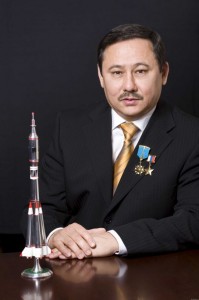Kazkosmos projects aimed at creating a space industry in Kazakhstan are nearing completion, according to Chairman of the Aerospace Committee of the Kazakh Ministry of Investment and Development Talgat Mussabayev.
“These projects will help the Kazakhstan space industry enter the global space market. Today, we can say that our country is already on a par with countries that have spacecraft systems at their disposal,” Mussabayev said.
Two satellites for medium and high-resolution Earth remote sensing were launched in 2014 from the Kourou spaceport in French Guiana and Yasniy spaceport in Russia. In addition, the KazSat-2 communications satellite has continued to work successfully in orbit and a testing procedure has been started for the KazSat-3 satellite. KazSat series satellites are managed solely by Kazakh specialists working in spacecraft management centres in Akkol in the Akmola region and in the Almaty region, the last one first introduced into regular operation in 2013.
Airbus Defence & Space, a French company, is Kazakhstan’s main strategic partner in implementing the project to create a system of remote sensing. The cooperation with French partners began in 2009 with the signing of an intergovernmental agreement on the peaceful use of outer space during the official visit by French President Nicolas Sarkozy.
“Thus, our country has two full satellite systems, which makes it more independent in the use of space technologies for the benefit of the economy and security. Never before has Kazakhstan launched three spacecraft systems in orbit simultaneously and at the same time had four domestic satellites. This is a timely execution of the tasks that President [Nursultan] Nazarbayev had set for Kazkosmos as a long-term strategy stated in the nation’s Kazakhstan 2050 Strategy,” Mussabayev said.
Plans are also underway to establish a Baiterek space rocket complex on the base of Baikonur spaceport by 2022. Joint proposals between Kazkosmos and Roskosmos to implement the project were approved during the second session of the Kazakh-Russian intergovernmental commission on the Baikonur complex held Nov. 24, 2014. The final joint action plan should be approved during the first quarter of the current year.
In his annual address to the people, Nazarbayev said that the state should expand its role in the global space market by 2030 and bring a number of ongoing projects to fruition. This includes constructing the spacecraft assembly and test complex in Astana, establishing the space system for remote sensing and a national space monitoring system and ground infrastructure system for high-precision satellite navigation.
In 2014, Baikonur once again received the title of the most used spaceport in the world. Twenty-one rockets were launched from Baikonur in the past year, 19 of which were successful. Cape Canaveral in the United States followed with 18 launches, all of which were successful.

